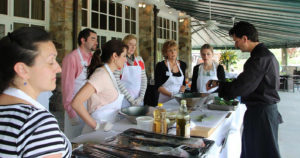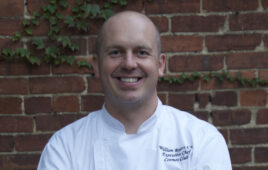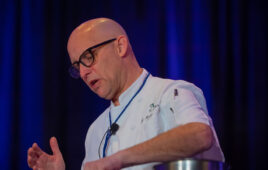
Members at Fiddler’s Elbow CC gather around as Executive Chef Michael Weisshaupt leads an outdoor cooking class.
Member cooking classes are gaining traction, as they fill a need and fuel a passion.
Club members are not only interested in who prepares their food. They also want to learn how to replicate their favorite dishes at home. As a result, cooking classes, hosted by the club’s Executive Chef, are moving to mainstream. They can also serve as an especially effective way for club chefs to connect with members and guests and showcase a property’s special culinary appeal.
At Bermuda Run (N.C.) Country Club, Executive Chef Eric Kirkeeng hosts 15 to 20 members every other month as part of the club’s cooking-class series.
Members join Kirkeeng and his sous chefs in the banquet kitchen, where they prepare an easy-to-replicate, but-still-upscale, five-course meal. When the cooking is done, they dine.
“We have appetizers ready for members as they arrive,” says Kirkeeng, who has been with the club for nearly four years. “We have a server take drink orders as well. Then I explain the menu and invite them to sit down and enjoy the show.”
Kirkeeng methodically walks through the steps he takes to prepare each dish, noting the most important elements as well as tricks of the trade.
“We try to talk about techniques like knife skills and proper cooking methods,” says Kirkeeng, who charges only $25 per member for the class. “We get the best feedback when we offer suggestions and tips that members can use beyond the dishes they are learning about in class.”
Members are also given a booklet of recipes that includes a space for note-taking. “We encourage them to ask questions and interrupt,” says Kirkeeng.
At Normanside Country Club (NCC), Delmar, N.Y., Executive Chef Kenneth Ruud also gives cookingclass students a booklet of recipes with notes.
“Each dish needs to be realistic for a home cook to understand,” says Ruud, who has been with the club for four years. “We don’t use equipment, ingredients, or techniques that are ‘above’ our members. At the same time we try to introduce dishes, ingredients, and techniques that are new and interesting.”
At NCC, classes are held in either banquet spaces or, if it’s a grilling-themed class, outdoors. “We run the class as a demo,” says Ruud. “I introduce the theme, demo the dish, pour the wine, then serve and repeat.”
Ruud stresses the importance of not only knowing the “hows” but also the “whys” for each dish that is featured as part of the class. And he stresses the need to be flexible, too.
“This is an educational event, as well as a forum for entertainment,” he says. “The menus have to be executed easily from the kitchen, as the timing isn’t set during the class. It can go fast or slow, depending on the number of questions being asked.”
The Perfect Size
NCC likes to cap its class size around 30 people.
“Any bigger and it’s harder to control,” says Ruud, who has done classes of up to 100 for private events. Fiddler’s Elbow Country Club (FECC), Bedminster
Township, N.J., caps its classes at around 20 members.
For these events, FECC sets up demonstration stations in its banquet rooms or outside on the patio, so members can participate in the cooking alongside Executive Chef Michael Weisshaupt.
“Cooking classes give our members an opportunity to look behind the curtain and spend time with the culinary team, which is something they don’t generally have an opportunity to do,” says Weisshaupt, who has been with the club for two and a half years.
Weisshaupt makes the most of this time, engaging with members to find out what they’re most interested in learning. He then structures the club’s monthly classes around those topics of interest.
“We’ve done everything from butchering to grilling to pasta-making,” he says.
In fact, the club’s maître d’, Marco Nicoletti, gets involved with the classes by running both the scratch pasta and scratch pizza classes. “I totally step back and let him run the show,” says Weisshaupt.
“He has a really engaging personality, and members love learning from him.”
For more intimate groups, Weisshaupt will bring them to the back of the house, where more elaborate equipment can be used.
“We have some very serious home cooks who want to learn more about proper technique,” says Weisshaupt. “We just hosted a braising and roasting class for a group like this, and it was a huge success.”
FECC also hosts parent/child cooking classes as well as couples’ cooking classes, charging anywhere between $50 and $80 per class, depending on the subject.
“We always give our students a parting gift that relates to the class,” adds Weisshaupt. “We’ve done ravioli cutters, gnocchi boards, and different salts in the past.”
Finding the Frequency
NCC hosts classes once every six weeks. Similar to Fiddler’s Elbow, the club sets up classes in the banquet room, demo-style. Members pay $55 per class, and the club caps the number of students at 30.
“Some members come just to be entertained, while others come to learn new things,” says Ruud. “Either way, it adds value to their membership and gives them a chance to engage with their club in a way that is more intimate and personal.”
Abilene (Texas) Country Club plans to host its first-ever cooking class in May.
Executive Chef Christopher Todd, who is new to Abilene but not the club industry, has high hopes for the class, as member interest is off the charts.
“We had to limit the event to 50 people,” says Todd. “I think members are really excited to get to see the operation from the inside out. Plus, they are eager to learn new techniques, get to know their new chef, and spend time with other
like-minded members.”


